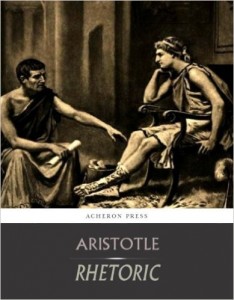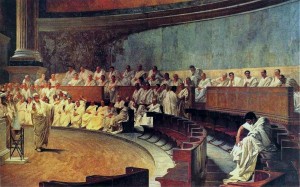Surely you have taken leave of your senses, you men of Galatia! Who has cast this spell over you, before whose very eyes Jesus Christ has been exposed to view as nailed on a cross? — Galatians 3:1, Cassirer’s translation.
Recent comments on Vridar prompted me to recheck what we know about this odd-sounding verse. Here I’ll quote the ancient sources that provide an explanatory context but I’ll also go one step further and (in debt to Thomas Brodie) look at a plausible inspiration for this expression and how it relates to the Gospel of Mark’s Passion Narrative. When we put this together and embrace the possibility of the Gospel’s debt to Paul’s letters then an interesting relationship between the two emerges over this very verse — of the Galatians apparently seeing Jesus Christ crucified before their very eyes.
But let’s begin with how Jesus was crucified “before their eyes”.
Hans Dieter Betz explains:
One of the goals of the ancient orator was to deliver his speech so vividly and impressively that his listeners imagined the matter to have happened right before their eyes. (Galatians, p. 131)
The evidence for this claim?
Aristotle
 Aristotle for one, Rhetoric, 3.11. I quote the passage at some length because Aristotle includes in his discussion a particular feature that we find in abundance throughout the Gospel of Mark — puns and other forms of wordplay .
Aristotle for one, Rhetoric, 3.11. I quote the passage at some length because Aristotle includes in his discussion a particular feature that we find in abundance throughout the Gospel of Mark — puns and other forms of wordplay .
It has already been mentioned that liveliness is got by using the proportional type of metaphor and being making (ie. making your hearers see things). We have still to explain what we mean by their ‘seeing things’, and what must be done to effect this. By ‘making them see things’ I mean using expressions that represent things as in a state of activity. Thus, to say that a good man is ‘four-square’ is certainly a metaphor; both the good man and the square are perfect; but the metaphor does not suggest activity. On the other hand, in the expression ‘with his vigour in full bloom’ there is a notion of activity; and so in ‘But you must roam as free as a sacred victim’; and in
“Thereas up sprang the Hellenes to their feet, “
where ‘up sprang’ gives us activity as well as metaphor, for it at once suggests swiftness. So with Homer’s common practice of giving metaphorical life to lifeless things: all such passages are distinguished by the effect of activity they convey. Thus,
“Downward anon to the valley rebounded the boulder remorseless; and “
“The (bitter) arrow flew; “
and
“Flying on eagerly; and “
Stuck in the earth, still panting to feed on the flesh of the heroes; and
“And the point of the spear in its fury drove
“full through his breastbone. “
In all these examples the things have the effect of being active because they are made into living beings; shameless behaviour and fury and so on are all forms of activity. And the poet has attached these ideas to the things by means of proportional metaphors: as the stone is to Sisyphus, so is the shameless man to his victim. In his famous similes, too, he treats inanimate things in the same way:
“Curving and crested with white, host following
“host without ceasing. “
Here he represents everything as moving and living; and activity is movement.
Metaphors must be drawn, as has been said already, from things that are related to the original thing, and yet not obviously so related-just as in philosophy also an acute mind will perceive resemblances even in things far apart. Thus Archytas said that an arbitrator and an altar were the same, since the injured fly to both for refuge. Or you might say that an anchor and an overhead hook were the same, since both are in a way the same, only the one secures things from below and the other from above. And to speak of states as ‘levelled’ is to identify two widely different things, the equality of a physical surface and the equality of political powers.
Liveliness is specially conveyed by metaphor, and by the further power of surprising the hearer; because the hearer expected something different, his acquisition of the new idea impresses him all the more. His mind seems to say, ‘Yes, to be sure; I never thought of that’. The liveliness of epigrammatic remarks is due to the meaning not being just what the words say: as in the saying of Stesichorus that ‘the cicalas will chirp to themselves on the ground’. Well-constructed riddles are attractive for the same reason; a new idea is conveyed, and there is metaphorical expression. So with the ‘novelties’ of Theodorus. In these the thought is startling, and, as Theodorus puts it, does not fit in with the ideas you already have. They are like the burlesque words that one finds in the comic writers. The effect is produced even by jokes depending upon changes of the letters of a word; this too is a surprise. You find this in verse as well as in prose. The word which comes is not what the hearer imagined: thus
“Onward he came, and his feet were shod with his-chilblains, “
where one imagined the word would be ‘sandals’. But the point should be clear the moment the words are uttered. . . . This is also true of such lively remarks as the one to the effect that to the Athenians their empire (arche) of the sea was not the beginning (arche) of their troubles, since they gained by it. Or the opposite one of Isocrates, that their empire (arche) was the beginning (arche) of their troubles. Either way, the speaker says something unexpected, the soundness of which is thereupon recognized. There would be nothing clever in saying ’empire is empire’. Isocrates means more than that, and uses the word with a new meaning. So too with the former saying, which denies that arche in one sense was arche in another sense. . . .
. . . . The more a saying has these qualities, the livelier it appears: if, for instance, its wording is metaphorical, metaphorical in the right way, antithetical, and balanced, and at the same time it gives an idea of activity.
Successful similes also, as has been said above, are in a sense metaphors, since they always involve two relations like the proportional metaphor. . . .
Cicero

Then there is Cicero’s On the Orator (De Oratore), 3.40
Here almost every thing is expressed in words metaphorically adapted from something similar, that the description may be heightened. . . .
but, even in the greatest abundance of proper words, men are much more charmed with such as are uncommon, if they are used metaphorically with judgment. This happens, I imagine, either because it is some manifestation of wit to jump over such expressions as lie before you, and catch at others from a greater distance ; or be cause he who listens is led another way in thought, and yet does not wander from the subject, which is a very great pleasure ; or because a subject, and entire comparison, is dispatched in a single word ; or because every metaphor that is adopted with judgment, is directed immediately to our senses, and principally to the sense of sight, which is the keenest of them all. For such expressions as the odor of urbanity, the softness of humanity, the murmur of the sea, and sweetness of
language, are derived from the other senses ; but those which relate to the sight are much more striking, for they place almost in the eye of the mind such objects as we can not see and discern by the natural eyes.
Continue reading “Crucifixion Portrayed Before the Very Eyes of Galatians”
Like this:
Like Loading...



